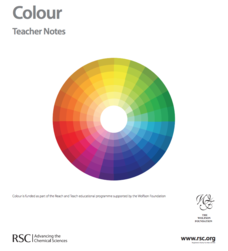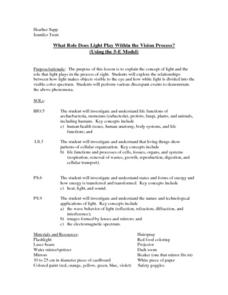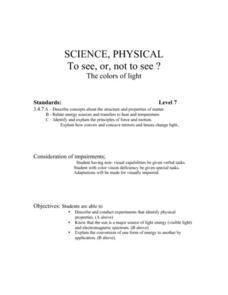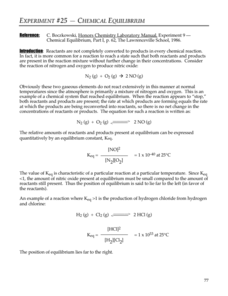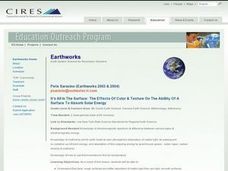McGraw Hill
Stellar Spectroscopy Interactive
Stars seem to be a far away mystery... but it turns out we know much more about stars than one would think! An engaging lesson shows learners how to read a light spectrum to determine the temperature and chemical makeup of a star. They...
Royal Society of Chemistry
Colour—Gifted and Talented Chemistry
Add a splash of color to your chemistry class! Science scholars discover the principles behind color through a wide variety of hands-on activities. Lessons include dyes, chromatography, and flame tests.
NASA
Things Are Not Always What They Seem
Science is magic that works. Magical color-changing beads and a coffee can that follows voice commands are just two examples of magic tricks that rely on science. After completing a hands-on activity and an experiment investigating the...
Curated OER
Which Colored Filter Will Decode a Secret Message?
Students investigate how to create secrete messages through filters. They view pictures with red and green filters and discuss what they observe. They select the color filter that works best to read secret messages. They view pictures...
Curated OER
Fluorescence
Here are some instructions for leading learners through a hands-on activity for investigating ultraviolet radiation. First, introduce them to light and refraction. Then introduce them to the electromagnetic spectrum. Finally, give...
Curated OER
Color Recognition
Students envision how space observatories make use of monochromatic filters to collect data on the color of objects in space. They see the actual colors of objects when they are in monochromatic light.
Curated OER
The Effects of Light and Temperature on the Growth and Development of Plants
Students investigate the effects of light and temperature on plant growth and development. For this plant growth lesson plan, students use radish plants and cover them with different shades of green and red transparencies and observe...
Curated OER
Check Out Lights and Shields with Beads
Learners explore Ultraviolet detecting beads and conduct several investigations with them. In this investigative lesson students participate in an experiment to see the harmful effects of UV light and discuss their findings.
Curated OER
Understanding Light: Lesson 2 - The Electromagnetic Spectrum
Young scholars investigate the Electromagnetic Spectrum and realize there is energy beyond visible light. They identify parts of the EM Spectrum.
Curated OER
What Role Does Light Play Within the Vision Process?
Learners are introduced to the relationship between light and vision. In groups, they participate in experiments to discover how different wavelengths are divided in the visible spectrum. They record their answers and discuss their...
PBS
Blow the Roof Off!
Blow the minds of young scientists with this collection of inquiry-based investigations. Based on a series of eight videos, these "hands-on, minds-on" science lessons engage young learners in exploring a wide range of topics from making...
Santa Monica College
Flame Tests of Metal Cations
Scientists used flame tests to identify elements long before the invention of emission spectroscopy. Young chemists observe a flame test of five metal cations in the fourth lesson of an 11-part series. Individuals then work...
Curated OER
To See or Not to See: The Colors of Light
Seventh graders describe and conduct an experiment that identifies the physical properties of light. They explore sources of visible light and an electromagnetic spectrum. Students explain the conversion of one form of energy to another.
Curated OER
Picture This!
Students compare and contrast different types of light on the electromagnetic spectrum. In this investigative lesson students create a photographic image that demonstrates the infrared, ultraviolet and polarization phenomena.
Curated OER
Illustrated Words - colored pencils
Students use images and lettering style to communicate the meaning of a specific word chosen for the composition. They make rich, smooth, layered areas of color using colored pencils.
Curated OER
Electromagnetic Radiation
Students explore the nature of electromagnetic spectrum through a series of experiments. For this physics lesson, students determine how light behaves under certain circumstances. They explain how humans perceive colors.
Curated OER
Internet Quest: Weatherman Walt-Why the Sky is Blue
Learners analyze atmosphere and light. In this earth science lesson, students are introduced to an investigation about why the sky is blue. Learners complete a WebQuest to answer the question.
Curated OER
How to verify the relationship between the wavelength and frequency of light
Students collaborate in heterogeneous groups with each student having a different role. They comprehend the relationship between the frequency and wavelength of light. They record their observations in a table that is included on this...
Curated OER
Electromagnetic Spectrum/Spectroscopy
Students examine the electromagnetic spectrum and demonstrate the elements within. For this investigative lesson students complete a demonstration and calculate the energy of a photon.
University of Texas
Multi-wavelength Astronomy
Explore a land far, far away with a well-designed lesson that examines electromagnetic imaging as a way to obtain information about galactic structures. Learners begin to see the importance of looking beyond the visual spectrum to reveal...
Pingry School
Chemical Equilibrium
We know about the light spectrum, the age spectrum, and sound spectrum, but do chemical reactions also occur on a spectrum? Young scientists experiment with partial reactions on a spectrum and observe the color changes. Then, they...
Curated OER
Colors
Students examine what colors are in white and other colors of light. In this light prism lesson students complete a lab activity that helps them understand complimentary colors.
Curated OER
The Sun's Energy
Sixth graders examine how the sun's energy arrives as light with a range of wavelengths. They discuss the characteristics of light, examine the color of light using a spectroscope, and conduct an experiment using water and thermometers....
Curated OER
It's All In The Surface: The Effects Of Color & Texture On The Ability Of A Surface To Absorb Solar Energy
Ninth graders examine how dark surfaces absorb more light than light surfaces. They perform an experiment that compares various surfaces abilities to absorb heat, then record and analyze the results.



